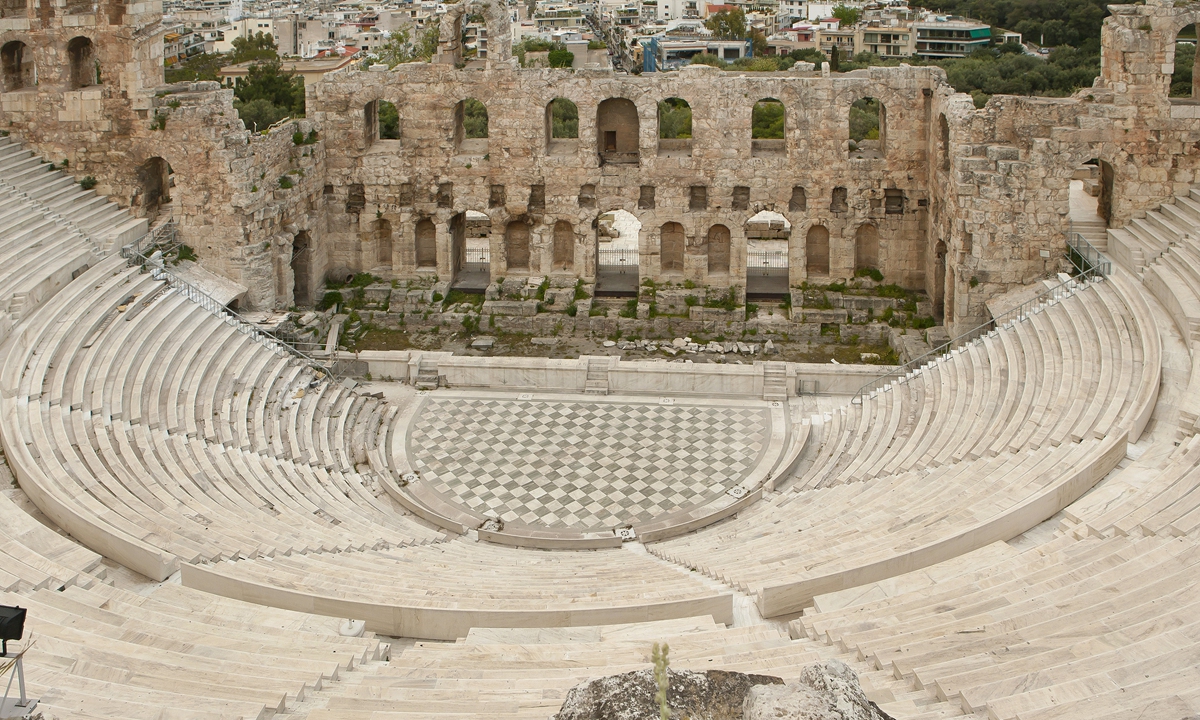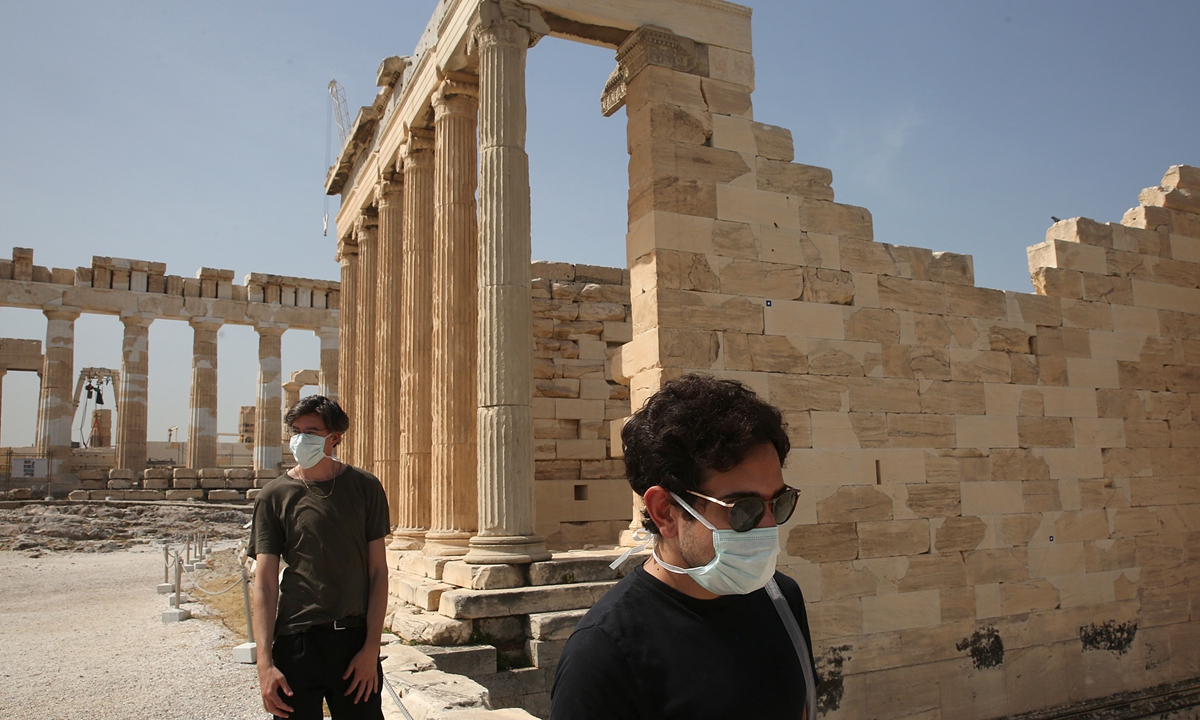2,000-year-old Athens theater hosts first-ever contemporary art exhibit
Source:Xinhua Published: 2020/6/29 17:33:45

The Odeon of Herodes Atticus, a Roman stone theater built in 161 by Herodes Atticus in memory of his wife, Aspasia Annia Regilla, on the southern slopes of the Acropolis of Athens in Greece Photo: AFP

Tourists from the Netherlands visit the Acropolis of Athens in Greece on May 18. Photo: IC
During summer time in previous years, thousands of spectators would swarm the ancient Odeon of Herodes Atticus, one of the most iconic landmarks of Athens, every night for world-class music, dance or theater performances in the course of the Athens and Epidaurus Festival.
As the coronavirus pandemic has disrupted this year's festival program, the emblematic theater, in an interesting art experiment carried out in partnership with the NEON Cultural Organization and for the first time in its 2,000-year history, is playing host to a contemporary sculpture exhibition.
Taking side paths
"In all this bad luck, if you can say it's bad luck, this whole crisis, I am lucky and very honored to exhibit in this place," distinguished Greek artist Dionysis Kavallieratos said as he gave a tour of his exhibits.
Under the title Disoriented dance / Misled planet, Kavallieratos presents a sculptural installation related to dance, as his original works form two circles that develop on the main stage of the theater in various heights and scales.
"His installation invokes all the rituals and the drama of the ancient theater and of the chorus. And if you look closely at his sculptural installations and his works, you will find many references that relate with the cultures around the world," explained Elina Kountouri, artistic director of the NEON Cultural Organization.
The "dancers" is an ongoing project Kavallieratos first started in 2016. Putting at work his keen powers of social observation, popular art, the Greek cultural heritage as well as humor and irony, the Berlin-based sculptor drew his inspiration from history, art history, architecture, common household objects, people's relations and his own personal experiences.
"Each dancer comes from a different world, a different universe... My first idea was to make this circle dance, this was the axis, the route on which I had to walk, a straight line. But then, on this straight line, I could go on side paths, which are the different worlds, so I could explore those different characters," he added.
In order for them to tell their own unique story, Kavallieratos's 40 peculiar "dancers" are made of various materials, such as copper, clay, resin and wood, and despite their striking differences in style and techniques, they all join functionally in this baffling dance that reminds us of human history and everyday life, the artist pointed out.
As a result, a Sphinx is dancing next to a Cycladic effigy and a staircase next to a compilation of vegetables, a composition of the dismembered "Vagabonds of the Western World" next to a multi-faceted mirror sculpture of "An actor who played an actor that played an actor."
"It looks like they came out of a dream," Lorna, a visitor of the exhibition, told the Xinhua News Agency.
The Pitchers, one of the most popular pieces of the exhibition, is a complex of four peasant women who carry pitchers of water back to their homes: a white peasant, a black peasant, an ancient Greek-styled "statue-within-a-statue" woman and... an alien peasant. They have all swapped members of their bodies with each other in a peculiar dance transcending time and place.
"For me, it's a metaphor for our whole universe, let's say the world, the planet. It's a metaphor. These are all us. There could be hundreds more of these sculptures - I am also planning to make them," Kavallieratos stressed, promising many sequels to this project.
It is not the first time NEON nonprofit cultural foundation brings contemporary artistic creation into landmarks of the city.
"Our main principle is that we don't have space and we say that our space is the city. So, we try to connect art, the artist, the audience with the public space. Our mission is how we can deliver change in the city through art," Kountouri explained.
Working together
Thanks to the City Project, which is running for the seventh year, modern artists commissioned by NEON have exhibited their works in numerous ancient Greek sites, such as Delos island, the Roman Agora, Kerameikos cemetery and now the Odeon of Herodes Atticus, which has a capacity of over 5,000 people, breathing in new life to historic landmarks.
According to Kountouri, when you want to negotiate the public space, the collaboration between private initiatives and long-standing public art institutions, such as the Athens and Epidaurus Festival, is crucial as long as there is common ground.
"The idea is how we can advance culture in Greece, how we can show the best of contemporary making to the audiences and how we can support local artists as well?" Kountouri asked.
"So, if you have the same principles, then I think that the public and the private sector can work really well together and have a constructive collaboration," she added.
"This contrast highlights the works. It's original. It makes them stand out more. The circular structure resonates with the shape of the theater," Olivia, another viewer, said after touring the exhibition.
The exhibition, which opened in early June, will run until Sunday and, although admission is free, visitors have to book online and enter the venue in groups of 20 every 20 minutes.
It marks the opening of the 65th edition of the Athens and Epidaurus Festival, which attracts thousands of Greek and foreign spectators every year from May to October. The year 2020, health safety constraints have forced the festival to modify its program.
Newspaper headline: New life
Posted in: ART,CULTURE & LEISURE,ARTS FOCUS